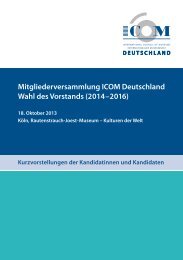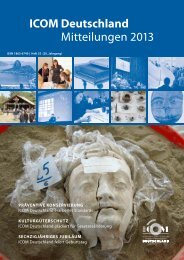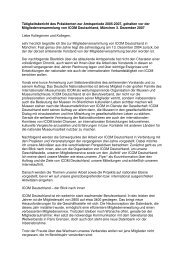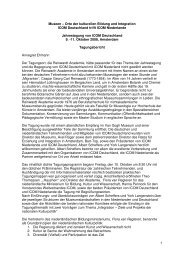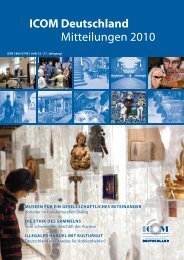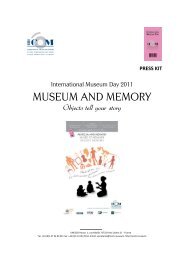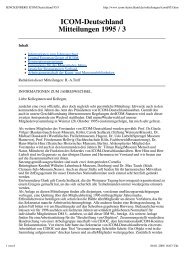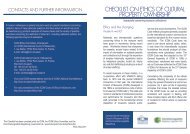ICOM Code of Ethics for Museums - The International Council of ...
ICOM Code of Ethics for Museums - The International Council of ...
ICOM Code of Ethics for Museums - The International Council of ...
Create successful ePaper yourself
Turn your PDF publications into a flip-book with our unique Google optimized e-Paper software.
<strong>ICOM</strong> <strong>Code</strong> <strong>of</strong><br />
<strong>Ethics</strong><br />
<strong>for</strong> <strong>Museums</strong>
<strong>ICOM</strong> CODE OF ETHICS<br />
FOR MUSEUMS<br />
<strong>The</strong> cornerstone <strong>of</strong> <strong>ICOM</strong> is the <strong>ICOM</strong> <strong>Code</strong> <strong>of</strong> <strong>Ethics</strong> <strong>for</strong><br />
<strong>Museums</strong>. It sets minimum standards <strong>of</strong> pr<strong>of</strong>essional practice<br />
and per<strong>for</strong>mance <strong>for</strong> museums and their staff. In joining the<br />
organisation, <strong>ICOM</strong> members undertake to abide by<br />
this <strong>Code</strong>.<br />
Ethical issues that require the attention and/or consideration <strong>of</strong><br />
the <strong>ICOM</strong> <strong>Ethics</strong> Committee may be addressed to its Chair by<br />
e-mail: ethics@icom.museum.<br />
<strong>The</strong> <strong>ICOM</strong> <strong>Code</strong> <strong>of</strong> Pr<strong>of</strong>essional <strong>Ethics</strong> was adopted unanimously by the 15 th<br />
General Assembly <strong>of</strong> <strong>ICOM</strong> in Buenos Aires (Argentina) on 4 November<br />
1986. It was amended by the 20 th General Assembly in Barcelona (Spain)<br />
on 6 July 2001, retitled <strong>ICOM</strong> <strong>Code</strong> <strong>of</strong> <strong>Ethics</strong> <strong>for</strong> <strong>Museums</strong>, and revised by<br />
the 21 st General Assembly in Seoul (Republic <strong>of</strong> Korea) on 8 October 2004.<br />
© <strong>ICOM</strong>, 2013<br />
ISBN-978-92-9012-407-8<br />
II
III
pREAMBlE<br />
Status <strong>of</strong> the <strong>ICOM</strong> <strong>Code</strong> <strong>of</strong> <strong>Ethics</strong> <strong>for</strong> <strong>Museums</strong><br />
<strong>The</strong> <strong>ICOM</strong> <strong>Code</strong> <strong>of</strong> <strong>Ethics</strong> <strong>for</strong> <strong>Museums</strong> has been prepared by the <strong>International</strong><br />
<strong>Council</strong> <strong>of</strong> <strong>Museums</strong>. It is the statement <strong>of</strong> ethics <strong>for</strong> museums referred to in the<br />
<strong>ICOM</strong> Statutes. <strong>The</strong> <strong>Code</strong> reflects principles generally accepted by the international<br />
museum community. Membership in <strong>ICOM</strong> and the payment <strong>of</strong> the annual subscription<br />
to <strong>ICOM</strong> are an affirmation <strong>of</strong> the <strong>ICOM</strong> <strong>Code</strong> <strong>of</strong> <strong>Ethics</strong> <strong>for</strong> <strong>Museums</strong>.<br />
A Minimum Standard <strong>for</strong> <strong>Museums</strong><br />
<strong>The</strong> <strong>ICOM</strong> <strong>Code</strong> represents a minimum standard <strong>for</strong> museums. It is presented as a<br />
series <strong>of</strong> principles supported by guidelines <strong>for</strong> desirable pr<strong>of</strong>essional practice. In some<br />
countries, certain minimum standards are defined by law or government regulation.<br />
In others, guidance on and assessment <strong>of</strong> minimum pr<strong>of</strong>essional standards may be<br />
available in the <strong>for</strong>m <strong>of</strong> ’Accreditation’, ’Registration’, or similar evaluative schemes.<br />
Where such standards are not defined, guidance can be obtained through the <strong>ICOM</strong><br />
Secretariat, a relevant National Committee <strong>of</strong> <strong>ICOM</strong>, or the appropriate <strong>International</strong><br />
Committee <strong>of</strong> <strong>ICOM</strong>. It is also intended that individual nations and the specialised<br />
subject organisations connected with museums should use this <strong>Code</strong> as a basis <strong>for</strong><br />
developing additional standards.<br />
Translations <strong>of</strong> the <strong>ICOM</strong> <strong>Code</strong> <strong>of</strong> <strong>Ethics</strong> <strong>for</strong> <strong>Museums</strong><br />
<strong>The</strong> <strong>ICOM</strong> <strong>Code</strong> <strong>of</strong> <strong>Ethics</strong> <strong>for</strong> <strong>Museums</strong> is published in the three <strong>of</strong>ficial languages<br />
<strong>of</strong> the organisation: English, French and Spanish. <strong>ICOM</strong> welcomes the translation <strong>of</strong><br />
the <strong>Code</strong> into other languages. However, a translation will be regarded as “<strong>of</strong>ficial”<br />
only if it is endorsed by at least one National Committee <strong>of</strong> a country in which the<br />
language is spoken, normally as the first language. Where the language is spoken<br />
in more than one country, it is preferable that the National Committees <strong>of</strong> these<br />
countries also be consulted. Attention is drawn to the need <strong>for</strong> linguistic as well as<br />
pr<strong>of</strong>essional museum expertise in providing <strong>of</strong>ficial translations. <strong>The</strong> language version<br />
used <strong>for</strong> a translation and the names <strong>of</strong> the National Committees involved should be<br />
indicated. <strong>The</strong>se conditions do not restrict translations <strong>of</strong> the <strong>Code</strong>, or parts <strong>of</strong> it, <strong>for</strong><br />
use in educational work or <strong>for</strong> study purposes.<br />
IV
TABlE OF CONTENTS<br />
<strong>ICOM</strong> <strong>Code</strong> <strong>of</strong> <strong>Ethics</strong> <strong>for</strong> <strong>Museums</strong><br />
page 1<br />
page 3<br />
page 6<br />
page 8<br />
page 9<br />
page 10<br />
page 11<br />
page 12<br />
page 15<br />
1. <strong>Museums</strong> preserve, interpret and promote the natural and<br />
cultural inheritance <strong>of</strong> humanity.<br />
• Institutional standing<br />
• physical resources<br />
• Financial resources<br />
• personnel<br />
2. <strong>Museums</strong> that maintain collections hold them in trust <strong>for</strong> the<br />
benefit <strong>of</strong> society and its development.<br />
• Acquiring collections<br />
• Removing collections<br />
• Care <strong>of</strong> collections<br />
3. <strong>Museums</strong> hold primary evidence <strong>for</strong> establishing and<br />
furthering knowledge.<br />
• primary evidence<br />
• Museum collecting & research<br />
4. <strong>Museums</strong> provide opportunities <strong>for</strong> the appreciation,<br />
understanding and management <strong>of</strong> the natural and cultural<br />
heritage.<br />
• Display and exhibition<br />
• Other resources<br />
5. <strong>Museums</strong> hold resources that provide opportunities <strong>for</strong> other<br />
public services and benefits.<br />
• Identification services<br />
6. <strong>Museums</strong> work in close collaboration with the communities<br />
from which their collections originate as well as those they<br />
serve.<br />
• Origin <strong>of</strong> collections<br />
• Respect <strong>for</strong> communities served<br />
7. <strong>Museums</strong> operate in a legal manner.<br />
• legal framework<br />
8. <strong>Museums</strong> operate in a pr<strong>of</strong>essional manner.<br />
• pr<strong>of</strong>essional conduct<br />
• Conflicts <strong>of</strong> interest<br />
Glossary<br />
V
1. MUSEUMS pRESERVE, INTERpRET AND pROMOTE THE<br />
NATURAl AND CUlTURAl INHERITANCE OF HUMANITy.<br />
principle<br />
<strong>Museums</strong> are responsible <strong>for</strong> the tangible and intangible natural and cultural<br />
heritage. Governing bodies and those concerned with the strategic direction and<br />
oversight <strong>of</strong> museums have a primary responsibility to protect and promote this<br />
heritage as well as the human, physical and financial resources made available <strong>for</strong><br />
that purpose.<br />
INSTITUTIONAl STANDING<br />
1.1 Enabling Documentation<br />
<strong>The</strong> governing body should ensure that the<br />
museum has a written and published constitution,<br />
statute, or other public document in<br />
accordance with national laws, which<br />
clearly states the museum’s legal status,<br />
mission, permanence and non-pr<strong>of</strong>it nature.<br />
1.2 Statement <strong>of</strong> the Mission,<br />
Objectives and policies<br />
<strong>The</strong> governing body should prepare,<br />
publicise and be guided by a statement <strong>of</strong><br />
the mission, objectives and policies <strong>of</strong> the<br />
museum and <strong>of</strong> the role and composition<br />
<strong>of</strong> the governing body.<br />
pHySICAl RESOURCES<br />
1.3 premises<br />
<strong>The</strong> governing body should ensure<br />
adequate premises with a suitable<br />
environment <strong>for</strong> the museum to fulfil the<br />
basic functions defined in its mission.<br />
1.4 Access<br />
<strong>The</strong> governing body should ensure that the<br />
museum and its collections are available<br />
to all during reasonable hours and <strong>for</strong> regular<br />
periods. particular regard should be<br />
given to those persons with special needs.<br />
1.5 Health and Safety<br />
<strong>The</strong> governing body should ensure that<br />
institutional standards <strong>of</strong> health, safety<br />
and accessibility apply to its personnel<br />
and visitors.<br />
1.6 protection Against Disasters<br />
<strong>The</strong> governing body should develop and<br />
maintain policies to protect the public<br />
and personnel, the collections and other<br />
resources against natural and humanmade<br />
disasters.<br />
1.7 Security Requirements<br />
<strong>The</strong> governing body should ensure<br />
appropriate security to protect collections<br />
against theft or damage in displays, exhibitions,<br />
working or storage areas and while<br />
in transit.<br />
1.8 Insurance and Indemnity<br />
Where commercial insurance is used <strong>for</strong><br />
collections, the governing body should<br />
ensure that such cover is adequate and<br />
includes objects in transit or on loan and<br />
other items that are the responsibility <strong>of</strong><br />
the museum. When an indemnity scheme<br />
is in use, it is necessary that material not in<br />
the ownership <strong>of</strong> the museum be adequately<br />
covered.<br />
1
FINANCIAl RESOURCES<br />
1.9 Funding<br />
<strong>The</strong> governing body should ensure that<br />
there are sufficient funds to carry out and<br />
develop the activities <strong>of</strong> the museum. All<br />
funds must be accounted <strong>for</strong> in a pr<strong>of</strong>essional<br />
manner.<br />
1.10 Income-generating policy<br />
<strong>The</strong> governing body should have a written<br />
policy regarding sources <strong>of</strong> income that it<br />
may generate through its activities or accept<br />
from outside sources. Regardless <strong>of</strong><br />
funding source, museums should maintain<br />
control <strong>of</strong> the content and integrity <strong>of</strong> their<br />
programmes, exhibitions and activities.<br />
Income-generating activities should not<br />
compromise the standards <strong>of</strong> the institution<br />
or its public. (See 6.6).<br />
pERSONNEl<br />
1.11 Employment policy<br />
<strong>The</strong> governing body should ensure that<br />
all action concerning personnel is taken<br />
in accordance with the policies <strong>of</strong> the<br />
museum as well as the proper and legal<br />
procedures.<br />
1.12 Appointment <strong>of</strong> the Director<br />
or Head<br />
<strong>The</strong> director or head <strong>of</strong> the museum is a<br />
key post and when making an appointment,<br />
governing bodies should have regard<br />
<strong>for</strong> the knowledge and skills required<br />
to fill the post effectively. <strong>The</strong>se qualities<br />
should include adequate intellectual ability<br />
and pr<strong>of</strong>essional knowledge, complemented<br />
by a high standard <strong>of</strong> ethical conduct.<br />
1.13 Access to Governing Bodies<br />
<strong>The</strong> director or head <strong>of</strong> a museum should<br />
be directly responsible, and have direct<br />
access, to the relevant governing bodies.<br />
1.14 Competence <strong>of</strong> Museum<br />
personnel<br />
<strong>The</strong> employment <strong>of</strong> qualified personnel<br />
with the expertise required to meet all responsibilities<br />
is necessary. (See also 2.19;<br />
2.24; section 8).<br />
1.15 Training <strong>of</strong> personnel<br />
Adequate opportunities <strong>for</strong> the continuing<br />
education and pr<strong>of</strong>essional development<br />
<strong>of</strong> all museum personnel should be arranged<br />
to maintain an effective work<strong>for</strong>ce.<br />
1.16 Ethical Conflict<br />
<strong>The</strong> governing body should never require<br />
museum personnel to act in a way that<br />
could be considered to conflict with the<br />
provisions <strong>of</strong> this <strong>Code</strong> <strong>of</strong> <strong>Ethics</strong>, or any<br />
national law or specialist code <strong>of</strong> ethics.<br />
1.17 Museum personnel and<br />
Volunteers<br />
<strong>The</strong> governing body should have a written<br />
policy on volunteer work that promotes a<br />
positive relationship between volunteers<br />
and members <strong>of</strong> the museum pr<strong>of</strong>ession.<br />
1.18 Volunteers and <strong>Ethics</strong><br />
<strong>The</strong> governing body should ensure that<br />
volunteers, when conducting museum and<br />
personal activities, are fully conversant<br />
with the <strong>ICOM</strong> <strong>Code</strong> <strong>of</strong> <strong>Ethics</strong> <strong>for</strong> <strong>Museums</strong><br />
and other applicable codes and laws.<br />
2
2. MUSEUMS THAT MAINTAIN COllECTIONS HOlD THEM IN<br />
TRUST FOR THE BENEFIT OF SOCIETy AND ITS DEVElOpMENT.<br />
principle<br />
<strong>Museums</strong> have the duty to acquire, preserve and promote their collections as a contribution<br />
to safeguarding the natural, cultural and scientific heritage. <strong>The</strong>ir collections are<br />
a significant public inheritance, have a special position in law and are protected by<br />
international legislation. Inherent in this public trust is the notion <strong>of</strong> stewardship that<br />
includes rightful ownership, permanence, documentation, accessibility and responsible<br />
disposal.<br />
ACQUIRING COllECTIONS<br />
2.1 Collections policy<br />
<strong>The</strong> governing body <strong>for</strong> each museum<br />
should adopt and publish a written collections<br />
policy that addresses the acquisition,<br />
care and use <strong>of</strong> collections. <strong>The</strong> policy<br />
should clarify the position <strong>of</strong> any material<br />
that will not be catalogued, conserved, or<br />
exhibited. (See 2. 7; 2. 8).<br />
2. 2 Valid Title<br />
No object or specimen should be acquired<br />
by purchase, gift, loan, bequest, or<br />
exchange unless the acquiring museum is<br />
satisfied that a valid title is held. Evidence<br />
<strong>of</strong> lawful ownership in a country is not necessarily<br />
valid title.<br />
2.3 provenance and Due<br />
Diligence<br />
Every ef<strong>for</strong>t must be made be<strong>for</strong>e ac-quisition<br />
to ensure that any object or specimen<br />
<strong>of</strong>fered <strong>for</strong> purchase, gift, loan, bequest, or<br />
exchange has not been illegally obtained<br />
in, or exported from its country <strong>of</strong> origin or<br />
any intermediate country in which it might<br />
have been owned legally (including the<br />
museum’s own country). Due diligence in<br />
this regard should establish the full history<br />
<strong>of</strong> the item since discovery or production.<br />
2.4 Objects and Specimens<br />
from Unauthorised or Unscientific<br />
Fieldwork<br />
<strong>Museums</strong> should not acquire objects<br />
where there is reasonable cause to believe<br />
their recovery involved unauthorised<br />
or unscientific fieldwork, or intentional<br />
destruction or damage <strong>of</strong> monuments,<br />
archaeological or geological sites, or <strong>of</strong><br />
species and natural habitats. In the same<br />
way, acquisition should not occur if there<br />
has been a failure to disclose the finds to<br />
the owner or occupier <strong>of</strong> the land, or to<br />
the proper legal or governmental authorities.<br />
2.5 Culturally Sensitive Material<br />
Collections <strong>of</strong> human remains and ma-terial<br />
<strong>of</strong> sacred significance should be acquired<br />
only if they can be housed securely<br />
and cared <strong>for</strong> respectfully. This must be<br />
accomplished in a manner consistent with<br />
pr<strong>of</strong>essional standards and the interests<br />
and beliefs <strong>of</strong> members <strong>of</strong> the community,<br />
ethnic or religious groups from which<br />
the objects originated, where these are<br />
known. (See also 3.7; 4.3).<br />
3
2.6 protected Biological or<br />
Geological Specimens<br />
<strong>Museums</strong> should not acquire biological<br />
or geological specimens that have been<br />
collected, sold, or otherwise transferred<br />
in contravention <strong>of</strong> local, national, regional<br />
or international law or treaty relating<br />
to wildlife protection or natural history<br />
conservation.<br />
2.7 living Collections<br />
When the collections include live botanical<br />
or zoological specimens, special consideration<br />
should be given to the natural and<br />
social environment from which they are<br />
derived as well as any local, national,<br />
regional or international law or treaty<br />
relating to wildlife protection or natural<br />
history conservation.<br />
2.8 Working Collections<br />
<strong>The</strong> collections policy may include special<br />
considerations <strong>for</strong> certain types <strong>of</strong> working<br />
collections where the emphasis is on<br />
preserving cultural, scientific, or technical<br />
process rather than the object, or where<br />
objects or specimens are assembled <strong>for</strong><br />
regular handling and teaching purposes.<br />
(See also 2.1).<br />
2.9 Acquisition Outside<br />
Collections policy<br />
<strong>The</strong> acquisition <strong>of</strong> objects or specimens<br />
outside the museum’s stated policy should<br />
only be made in exceptional circumstances.<br />
<strong>The</strong> governing body should consider the<br />
pr<strong>of</strong>essional opinions available to it and<br />
the views <strong>of</strong> all interested parties. Consideration<br />
will include the significance <strong>of</strong> the<br />
object or specimen, including its context in<br />
the cultural or natural heritage, and the<br />
special interests <strong>of</strong> other museums collecting<br />
such material. However, even in these<br />
circumstances, objects without a valid title<br />
should not be acquired. (See also 3.4).<br />
2.10 Acquisitions Offered by<br />
Members <strong>of</strong> the Governing Body<br />
or Museum personnel<br />
Special care is required in considering<br />
any item, whether <strong>for</strong> sale, as a donation,<br />
or as a tax-benefit gift, from members <strong>of</strong><br />
governing bodies, museum personnel, or<br />
the families and close associates <strong>of</strong> these<br />
persons.<br />
2.11 Repositories <strong>of</strong> last Resort<br />
Nothing in this <strong>Code</strong> <strong>of</strong> <strong>Ethics</strong> should prevent<br />
a museum from acting as an authorised<br />
repository <strong>for</strong> unprovenanced, illicitly<br />
collected or recovered specimens or objects<br />
from the territory over which it has lawful<br />
responsibility.<br />
REMOVING COllECTIONS<br />
2.12 legal or Other powers <strong>of</strong><br />
Disposal<br />
Where the museum has legal powers permitting<br />
disposals, or has acquired objects<br />
subject to conditions <strong>of</strong> disposal, the legal<br />
or other requirements and procedures<br />
must be complied with fully. Where the<br />
original acquisition was subject to mandatory<br />
or other restrictions these conditions<br />
must be observed, unless it can be shown<br />
clearly that ad-herence to such restrictions<br />
is impossible or substantially detrimental to<br />
the institution and, if appropriate, relief<br />
may be sought through legal procedures.<br />
2.13 Deaccessioning from<br />
Museum Collections<br />
<strong>The</strong> removal <strong>of</strong> an object or specimen<br />
from a museum collection must only be<br />
undertaken with a full understanding <strong>of</strong><br />
the significance <strong>of</strong> the item, its character<br />
(whether renewable or non-renewable),<br />
legal standing, and any loss <strong>of</strong> public trust<br />
that might result from such action.<br />
2.14 Responsibility <strong>for</strong><br />
Deaccessioning<br />
<strong>The</strong> decision to deaccession should be the<br />
responsibility <strong>of</strong> the governing body acting<br />
in conjunction with the director <strong>of</strong> the<br />
museum and the curator <strong>of</strong> the collection<br />
concerned. Special arrangements may<br />
apply to working collections. (See 2.7; 2.8)<br />
.<br />
4
2.15 Disposal <strong>of</strong> Objects<br />
Removed from the Collections<br />
Each museum should have a policy defining<br />
authorised methods <strong>for</strong> permanently<br />
removing an object from the collections<br />
through donation, transfer, exchange,<br />
sale, repatriation, or destruction, and that<br />
allows the transfer <strong>of</strong> unrestricted title to<br />
any receiving agency. Complete records<br />
must be kept <strong>of</strong> all deaccessioning decisions,<br />
the objects involved, and the disposal<br />
<strong>of</strong> the object. <strong>The</strong>re will be a strong<br />
presumption that a deaccessioned item<br />
should first be <strong>of</strong>fered to another museum.<br />
2.16 Income from Disposal <strong>of</strong><br />
Collections<br />
Museum collections are held in public trust<br />
and may not be treated as a realisable<br />
asset. Money or compensation received<br />
from the deaccessioning and disposal <strong>of</strong><br />
objects and specimens from a museum<br />
collection should be used solely <strong>for</strong> the<br />
benefit <strong>of</strong> the collection and usually <strong>for</strong><br />
acquisitions to that same collection.<br />
2.17 purchase <strong>of</strong> Deaccessioned<br />
Collections<br />
Museum personnel, the governing body,<br />
or their families or close associates, should<br />
not be permitted to purchase objects that<br />
have been deaccessioned from a collection<br />
<strong>for</strong> which they are responsible.<br />
CARE OF COllECTIONS<br />
2.18 Collection Continuity<br />
<strong>The</strong> museum should establish and apply<br />
policies to ensure that its collections (both<br />
permanent and temporary) and associated<br />
in<strong>for</strong>mation, properly recorded,<br />
are available <strong>for</strong> current use and will be<br />
passed on to future generations in as<br />
good and safe a condition as practicable,<br />
having regard to current knowledge and<br />
resources.<br />
2.19 Delegation <strong>of</strong> Collection<br />
Responsibility<br />
pr<strong>of</strong>essional responsibilities involving the<br />
care <strong>of</strong> the collections should be assigned<br />
to persons with appropriate knowledge<br />
and skill or who are adequately supervised.<br />
(See also 8.11).<br />
2.20 Documentation <strong>of</strong><br />
Collections<br />
Museum collections should be documented<br />
according to accepted pr<strong>of</strong>essional<br />
standards. Such documentation should include<br />
a full identification and description<br />
<strong>of</strong> each item, its associations, provenance,<br />
condition, treatment and present location.<br />
Such data should be kept in a secure environment<br />
and be supported by retrieval<br />
systems providing access to the in<strong>for</strong>mation<br />
by the museum personnel and other<br />
legitimate users.<br />
2 . 21 protection Against<br />
Disasters<br />
Careful attention should be given to the<br />
development <strong>of</strong> policies to protect the collections<br />
during armed conflict and other<br />
human-made or natural disasters.<br />
2.22 Security <strong>of</strong> Collection and<br />
Associated Data<br />
<strong>The</strong> museum should exercise control to<br />
avoid disclosing sensitive personal or<br />
related in<strong>for</strong>mation and other confidential<br />
matters when collection data is made<br />
available to the public.<br />
2.23 preventive Conservation<br />
preventive conservation is an important<br />
element <strong>of</strong> museum policy and collections<br />
care. It is an essential responsibility<br />
<strong>of</strong> members <strong>of</strong> the museum pr<strong>of</strong>ession to<br />
create and maintain a protective environment<br />
<strong>for</strong> the collections in their care,<br />
whether in store, on display, or in transit.<br />
2 . 24 Collection Conservation<br />
and Restoration<br />
<strong>The</strong> museum should carefully monitor the<br />
condition <strong>of</strong> collections to determine when<br />
an object or specimen may require conservation-restoration<br />
work and the services<br />
<strong>of</strong> a qualified conservator-restorer. <strong>The</strong><br />
principal goal should be the stabilisation<br />
<strong>of</strong> the object or specimen. All conservation<br />
5
procedures should be documented and as<br />
reversible as possible, and all alterations<br />
should be clearly distinguishable from the<br />
original object or specimen.<br />
2. 25 Welfare <strong>of</strong> live Animals<br />
A museum that maintains living animals<br />
should assume full responsibility <strong>for</strong> their<br />
health and well-being. It should prepare<br />
and implement a safety code <strong>for</strong> the protection<br />
<strong>of</strong> its personnel and visitors, as well<br />
as <strong>of</strong> the animals, that has been approved<br />
by an expert in the veterinary field.<br />
Genetic modification should be clearly<br />
identifiable.<br />
2.26 personal Use <strong>of</strong> Museum<br />
Collections<br />
Museum personnel, the governing body,<br />
their families, close associates, or others<br />
should not be permitted to expropriate<br />
items from the museum collections, even<br />
temporarily, <strong>for</strong> any personal use.<br />
3. MUSEUMS HOlD pRIMARy EVIDENCE FOR ESTABlISHING<br />
AND FURTHERING KNOWlEDGE.<br />
principle<br />
<strong>Museums</strong> have particular responsibilities to all <strong>for</strong> the care, accessibility and<br />
interpretation <strong>of</strong> primary evidence collected and held in their collections.<br />
pRIMARy EVIDENCE<br />
3.1 Collections as primary<br />
Evidence<br />
<strong>The</strong> museum collections policy should indicate<br />
clearly the significance <strong>of</strong> collections<br />
as primary evidence. <strong>The</strong> policy should not<br />
be governed only by current intellectual<br />
trends or present museum usage.<br />
3.2 Availability <strong>of</strong> Collections<br />
<strong>Museums</strong> have a particular responsibility<br />
<strong>for</strong> making collections and all relevant in<strong>for</strong>mation<br />
available as freely as possible,<br />
having regard to restraints arising <strong>for</strong> reasons<br />
<strong>of</strong> confidentiality and security.<br />
MUSEUM COllECTING & RESEARCH<br />
3.3 Field Collecting<br />
<strong>Museums</strong> undertaking field collecting<br />
should develop policies consistent with<br />
academic standards and applicable national<br />
and international laws and treaty<br />
obligations. Fieldwork should only be<br />
undertaken with respect and consideration<br />
<strong>for</strong> the views <strong>of</strong> local communities,<br />
their environmental resources and cultural<br />
practices as well as ef<strong>for</strong>ts to enhance the<br />
cultural and natural heritage.<br />
3.4 Exceptional Collecting <strong>of</strong><br />
primary Evidence<br />
In exceptional cases an item without provenance<br />
may have such an inherently<br />
outstanding contribution to knowledge<br />
that it would be in the public interest to<br />
preserve it. <strong>The</strong> acceptance <strong>of</strong> such an<br />
item into a museum collection should be<br />
the subject <strong>of</strong> a decision by specialists in<br />
the discipline concerned and without national<br />
or international prejudice. (See also 2.11).<br />
6
3.5 Research<br />
Research by museum personnel should<br />
relate to the museum’s mission and objectives<br />
and con<strong>for</strong>m to established legal,<br />
ethical and academic practices.<br />
3.6 Destructive Analysis<br />
When destructive analytical techniques<br />
are undertaken, a complete record <strong>of</strong> the<br />
material analysed, the outcome <strong>of</strong> the<br />
analysis and the resulting research, including<br />
publications, should become a part <strong>of</strong><br />
the permanent record <strong>of</strong> the object.<br />
3.7 Human Remains and<br />
Materials <strong>of</strong> Sacred Significance<br />
Research on human remains and materials<br />
<strong>of</strong> sacred significance must be accomplished<br />
in a manner consistent with pr<strong>of</strong>essional<br />
standards and take into account the<br />
interests and beliefs <strong>of</strong> the community, ethnic<br />
or religious groups from whom the objects<br />
originated, where these are known. (See<br />
also 2.5; 4.3).<br />
3.8 Retention <strong>of</strong> Rights to<br />
Research Materials<br />
When museum personnel prepare material<br />
<strong>for</strong> presentation or to document field investigation,<br />
there must be clear agreement<br />
with the sponsoring museum regarding<br />
all rights to such work.<br />
3.9 Shared Expertise<br />
Members <strong>of</strong> the museum pr<strong>of</strong>ession have<br />
an obligation to share their knowledge<br />
and experience with colleagues, scholars<br />
and students in relevant fields. <strong>The</strong>y<br />
should respect and acknowledge those<br />
from whom they have learned and should<br />
pass on such advancements in techniques<br />
and experience that may be <strong>of</strong> benefit to<br />
others.<br />
3.10 Co-operation Between<br />
<strong>Museums</strong> and Other Institutions<br />
Museum personnel should acknowledge<br />
and endorse the need <strong>for</strong> cooperation<br />
and consultation between institutions with<br />
similar interests and collecting practices.<br />
This is particularly so with institutes <strong>of</strong><br />
higher education and certain public utilities<br />
where research may generate important<br />
collections <strong>for</strong> which there is no long-term<br />
security.<br />
7
4. MUSEUMS pROVIDE OppORTUNITIES FOR THE<br />
AppRECIATION, UNDERSTANDING AND MANAGEMENT<br />
OF THE NATURAl AND CUlTURAl HERITAGE.<br />
principle<br />
<strong>Museums</strong> have an important duty to develop their educational role and attract<br />
wider audiences from the community, locality, or group they serve. Interaction with<br />
the constituent community and promotion <strong>of</strong> their heritage is an integral part <strong>of</strong> the<br />
educational role <strong>of</strong> the museum.<br />
DISplAy & EXHIBITION<br />
4.1 Displays, Exhibitions and<br />
Special Activities<br />
Displays and temporary exhibitions, physical<br />
or electronic, should be in accordance<br />
with the stated mission, policy and purpose<br />
<strong>of</strong> the museum. <strong>The</strong>y should not compromise<br />
either the quality or the proper care and<br />
conservation <strong>of</strong> the collections.<br />
4.2 Interpretation <strong>of</strong> Exhibitions<br />
<strong>Museums</strong> should ensure that the in<strong>for</strong>mation<br />
they present in displays and exhibitions<br />
is well-founded, accurate and gives<br />
appropriate consideration to represented<br />
groups or beliefs.<br />
4.3 Exhibition <strong>of</strong> Sensitive<br />
Materials<br />
Human remains and materials <strong>of</strong> sacred<br />
significance must be displayed in a manner<br />
consistent with pr<strong>of</strong>essional standards<br />
and, where known, taking into account the<br />
interests and beliefs <strong>of</strong> members <strong>of</strong> the<br />
community, ethnic or religious groups from<br />
whom the objects originated. <strong>The</strong>y must<br />
be presented with great tact and respect<br />
<strong>for</strong> the feelings <strong>of</strong> human dignity held by<br />
all peoples.<br />
4.4 Removal from public Display<br />
Requests <strong>for</strong> removal from public display<br />
<strong>of</strong> human remains or material <strong>of</strong> sacred significance<br />
from the originating communities<br />
must be addressed expeditiously with respect<br />
and sensitivity. Requests <strong>for</strong> the return<br />
<strong>of</strong> such material should be addressed similarly.<br />
Museum policies should clearly define<br />
the process <strong>for</strong> responding to such requests.<br />
4.5 Display <strong>of</strong> Unprovenanced<br />
Material<br />
<strong>Museums</strong> should avoid displaying or<br />
otherwise using material <strong>of</strong> questionable<br />
origin or lacking provenance. <strong>The</strong>y should<br />
be aware that such displays or usage can<br />
be seen to condone and contribute to the<br />
illicit trade in cultural property.<br />
OTHER RESOURCES<br />
4.6 publication<br />
In<strong>for</strong>mation published by museums, by<br />
whatever means, should be well-founded,<br />
accurate and give responsible consideration<br />
to the academic disciplines, societies,<br />
or beliefs presented. Museum publications<br />
should not compromise the standards <strong>of</strong><br />
the institution.<br />
4.7 Reproductions<br />
<strong>Museums</strong> should respect the integrity <strong>of</strong><br />
the original when replicas, reproductions,<br />
or copies <strong>of</strong> items in the collection are<br />
made. All such copies should be permanently<br />
marked as facsimiles.<br />
8
5. MUSEUMS HOlD RESOURCES THAT pROVIDE<br />
OppORTUNITIES FOR OTHER pUBlIC SERVICES AND BENEFITS.<br />
principle<br />
<strong>Museums</strong> utilise a wide variety <strong>of</strong> specialisms, skills and physical resources that have<br />
a far broader application than in the museum. This may lead to shared resources or<br />
the provision <strong>of</strong> services as an extension <strong>of</strong> the museum’s activities. <strong>The</strong>se should be<br />
organised in such a way that they do not compromise the museum’s stated mission.<br />
IDENTIFICATION SERVICES<br />
5.1 Identification <strong>of</strong> Illegally or<br />
Illicitly Acquired Objects<br />
Where museums provide an identification<br />
service, they should not act in any way<br />
that could be regarded as benefiting<br />
from such activity, directly or indirectly.<br />
<strong>The</strong> identification and authentication <strong>of</strong><br />
objects that are believed or suspected<br />
to have been illegally or illicitly acquired,<br />
transferred, imported or exported, should<br />
not be made public until the appropriate<br />
authorities have been notified.<br />
5.2 Authentication and Valuation<br />
(Appraisal)<br />
Valuations may be made <strong>for</strong> the purposes<br />
<strong>of</strong> insurance <strong>of</strong> museum collections. Opinions<br />
on the monetary value <strong>of</strong> other<br />
objects should only be given on <strong>of</strong>ficial<br />
request from other museums or competent<br />
legal, governmental or other responsible<br />
public authorities. However, when the<br />
museum itself may be the beneficiary, appraisal<br />
<strong>of</strong> an object or specimen must be<br />
undertaken independently.<br />
9
6. MUSEUMS WORK IN ClOSE COllABORATION WITH THE<br />
COMMUNITIES FROM WHICH THEIR COllECTIONS<br />
ORIGINATE AS WEll AS THOSE THEy SERVE.<br />
principle<br />
Museum collections reflect the cultural and natural heritage <strong>of</strong> the communities from<br />
which they have been derived. As such, they have a character beyond that <strong>of</strong> ordinary<br />
property, which may include strong affinities with national, regional, local, ethnic,<br />
religious or political identity. It is important there<strong>for</strong>e that museum policy is responsive<br />
to this situation.<br />
ORIGIN OF COllECTIONS<br />
6.1 Co-operation<br />
<strong>Museums</strong> should promote the sharing <strong>of</strong><br />
knowledge, documentation and collections<br />
with museums and cultural organisations<br />
in the countries and communities<br />
<strong>of</strong> origin. <strong>The</strong> possibility <strong>of</strong> developing<br />
partnerships with museums in countries or<br />
areas that have lost a significant part <strong>of</strong><br />
their heritage should be explored.<br />
6.2 Return <strong>of</strong> Cultural property<br />
<strong>Museums</strong> should be prepared to initiate<br />
dialogues <strong>for</strong> the return <strong>of</strong> cultural property<br />
to a country or people <strong>of</strong> origin.<br />
This should be undertaken in an impartial<br />
manner, based on scientific, pr<strong>of</strong>essional<br />
and humanitarian principles as well as<br />
applicable local, national and international<br />
legislation, in preference to action at a<br />
governmental or political level.<br />
6.3 Restitution <strong>of</strong> Cultural property<br />
When a country or people <strong>of</strong> origin seeks<br />
the restitution <strong>of</strong> an object or specimen<br />
that can be demonstrated to have been<br />
exported or otherwise transferred in violation<br />
<strong>of</strong> the principles <strong>of</strong> international and<br />
national conventions, and shown to be<br />
part <strong>of</strong> that country’s or people’s cultural<br />
or natural heritage, the museum concerned<br />
should, if legally free to do so, take<br />
prompt and responsible steps to cooperate<br />
in its return.<br />
6.4 Cultural Objects from an<br />
Occupied Country<br />
<strong>Museums</strong> should abstain from purchasing<br />
or acquiring cultural objects from an occupied<br />
territory and respect fully all laws<br />
and conventions that regulate the import,<br />
export and transfer <strong>of</strong> cultural or natural<br />
materials.<br />
RESpECT FOR COMMUNITIES SERVED<br />
6.5 Contemporary Communities<br />
Where museum activities involve a<br />
contemporary community or its heritage,<br />
acquisitions should only be made based<br />
on in<strong>for</strong>med and mutual consent without<br />
exploitation <strong>of</strong> the owner or in<strong>for</strong>mants.<br />
Respect <strong>for</strong> the wishes <strong>of</strong> the community<br />
involved should be paramount.<br />
6.6 Funding <strong>of</strong> Community<br />
Activities<br />
When seeking funds <strong>for</strong> activities involving<br />
contemporary communities, their interests<br />
should not be compromised. (See 1.10).<br />
10
6.7 Use <strong>of</strong> Collections from<br />
Contemporary Communities<br />
Museum usage <strong>of</strong> collections from contemporary<br />
communities requires respect <strong>for</strong><br />
human dignity and the traditions and<br />
cultures that use such material. Such collections<br />
should be used to promote human<br />
well-being, social development, tolerance,<br />
and respect by advocating multisocial,<br />
multicultural and multilingual expression.<br />
(See 4.3).<br />
6.8 Supporting Organisations in<br />
the Community<br />
<strong>Museums</strong> should create a favourable<br />
environment <strong>for</strong> community support (e.g.,<br />
Friends <strong>of</strong> <strong>Museums</strong> and other supporting<br />
organisations), recognise their contribution<br />
and promote a harmonious relationship<br />
between the community and museum personnel.<br />
7. MUSEUMS OpERATE IN A lEGAl MANNER.<br />
principle<br />
<strong>Museums</strong> must con<strong>for</strong>m fully to international, regional, national and local legislation<br />
and treaty obligations. In addition, the governing body should comply with any legally<br />
binding trusts or conditions relating to any aspect <strong>of</strong> the museum, its collections and<br />
operations.<br />
lEGAl FRAMEWORK<br />
7.1 National and local legislation<br />
<strong>Museums</strong> should con<strong>for</strong>m to all national<br />
and local laws and respect the legislation<br />
<strong>of</strong> other states as they affect their operation.<br />
7.2 <strong>International</strong> legislation<br />
Museum policy should acknowledge the<br />
following international legislation that is<br />
taken as a standard in interpreting the<br />
<strong>ICOM</strong> <strong>Code</strong> <strong>of</strong> <strong>Ethics</strong> <strong>for</strong> <strong>Museums</strong>:<br />
• Convention <strong>for</strong> the Protection <strong>of</strong> Cultural<br />
Property in the Event <strong>of</strong> Armed Conflict<br />
(“<strong>The</strong> Hague Convention” First protocol,<br />
1954, and Second protocol, 1999);<br />
• Convention on the Means <strong>of</strong> Prohibiting<br />
and Preventing the Illicit Import, Export<br />
and Transfer <strong>of</strong> Ownership <strong>of</strong> Cultural<br />
Property (UNESCO, 1970);<br />
• Convention on <strong>International</strong> Trade in<br />
Endangered Species <strong>of</strong> Wild Fauna and<br />
Flora (Washington, 1973);<br />
• Convention on Biological Diversity (UN,<br />
1992);<br />
• Convention on Stolen and Illicitly Exported<br />
Cultural Objects (UNIDROIT, 1995);<br />
• Convention on the Protection <strong>of</strong> the Underwater<br />
Cultural Heritage (UNESCO,<br />
2001);<br />
• Convention <strong>for</strong> the Safeguarding <strong>of</strong> the<br />
Intangible Cultural Heritage (UNESCO,<br />
2003).<br />
11
8. MUSEUMS OpERATE IN A pROFESSIONAl MANNER<br />
principle<br />
Members <strong>of</strong> the museum pr<strong>of</strong>ession should observe accepted standards and laws and<br />
uphold the dignity and honour <strong>of</strong> their pr<strong>of</strong>ession. <strong>The</strong>y should safeguard the public<br />
against illegal or unethical pr<strong>of</strong>essional conduct. Every opportunity should be used to<br />
in<strong>for</strong>m and educate the public about the aims, purposes, and aspirations <strong>of</strong> the pr<strong>of</strong>ession<br />
to develop a better public understanding <strong>of</strong> the contributions <strong>of</strong> museums to society.<br />
pROFESSIONAl CONDUCT<br />
8.1 Familiarity with Relevant<br />
legislation<br />
Every member <strong>of</strong> the museum pr<strong>of</strong>ession<br />
should be conversant with relevant international,<br />
national and local legislation<br />
and the conditions <strong>of</strong> their employment.<br />
<strong>The</strong>y should avoid situations that could be<br />
construed as improper conduct.<br />
8.2 pr<strong>of</strong>essional Responsibility<br />
Members <strong>of</strong> the museum pr<strong>of</strong>ession have<br />
an obligation to follow the policies and<br />
procedures <strong>of</strong> their employing institution.<br />
However, they may properly object to<br />
practices that are perceived to be damaging<br />
to a museum, to the pro-fession, or to<br />
matters <strong>of</strong> pr<strong>of</strong>essional ethics.<br />
8.3 pr<strong>of</strong>essional Conduct<br />
loyalty to colleagues and to the employing<br />
museum is an important pr<strong>of</strong>essional responsibility<br />
and must be based on allegiance<br />
to fundamental ethical principles<br />
applicable to the pr<strong>of</strong>ession as a whole.<br />
<strong>The</strong>se principles should comply with the<br />
terms <strong>of</strong> the <strong>ICOM</strong> <strong>Code</strong> <strong>of</strong> <strong>Ethics</strong> <strong>for</strong> <strong>Museums</strong><br />
and be aware <strong>of</strong> any other codes<br />
or policies relevant to museum work.<br />
8.4 Academic and Scientific<br />
Responsibilities<br />
Members <strong>of</strong> the museum pr<strong>of</strong>ession should<br />
promote the investigation, preservation,<br />
and use <strong>of</strong> in<strong>for</strong>mation inherent in collections.<br />
<strong>The</strong>y should, there<strong>for</strong>e, refrain from<br />
any activity or circumstance that might<br />
result in the loss <strong>of</strong> such academic and<br />
scientific data.<br />
8.5 <strong>The</strong> Illicit Market<br />
Members <strong>of</strong> the museum pr<strong>of</strong>ession should<br />
not support the illicit traffic or market in natural<br />
or cultural property, directly or indirectly.<br />
8.6 Confidentiality<br />
Members <strong>of</strong> the museum pr<strong>of</strong>ession must<br />
protect confidential in<strong>for</strong>mation obtained<br />
during their work. In addition, in<strong>for</strong>mation<br />
about items brought to the museum <strong>for</strong><br />
identification is confidential and should not<br />
be published or passed to any other institution<br />
or person without specific authorisation<br />
from the owner.<br />
8.7 Museum and Collection<br />
Security<br />
In<strong>for</strong>mation about the security <strong>of</strong> the museum<br />
or <strong>of</strong> private collections and locations<br />
visited during <strong>of</strong>ficial duties must be<br />
held in strict confidence by museum personnel.<br />
8.8 Exception to the Obligation<br />
<strong>for</strong> Confidentiality<br />
Confidentiality is subject to a legal obligation<br />
to assist the police or other proper authorities<br />
in investigating possible stolen, illicitly<br />
acquired, or illegally transferred property.<br />
12
8.9 personal Independence<br />
While members <strong>of</strong> a pr<strong>of</strong>ession are entitled<br />
to a measure <strong>of</strong> personal independence,<br />
they must realise that no private business<br />
or pr<strong>of</strong>essional interest can be wholly separated<br />
from their employing institution.<br />
8.10 pr<strong>of</strong>essional Relationships<br />
Members <strong>of</strong> the museum pr<strong>of</strong>ession <strong>for</strong>m<br />
working relationships with numerous other<br />
persons within and outside the museum in<br />
which they are employed. <strong>The</strong>y are expected<br />
to render their pr<strong>of</strong>essional services to<br />
others efficiently and to a high standard.<br />
8.11 pr<strong>of</strong>essional Consultation<br />
It is a pr<strong>of</strong>essional responsibility to consult<br />
other colleagues within or out-side the<br />
museum when the expertise available in<br />
the museum is insufficient to ensure good<br />
decision-making.<br />
CONFlICTS OF INTEREST<br />
8.12 Gifts, Favours, loans, or<br />
Other personal Benefits<br />
Museum employees must not accept gifts,<br />
favours, loans, or other personal benefits<br />
that may be <strong>of</strong>fered to them in connection<br />
with their duties <strong>for</strong> the museum. Occasionally<br />
pr<strong>of</strong>essional courtesy may include the<br />
giving and receiving <strong>of</strong> gifts, but this should<br />
always take place in the name <strong>of</strong> the institution<br />
concerned.<br />
8.13 Outside Employment or<br />
Business Interests<br />
Members <strong>of</strong> the museum pr<strong>of</strong>ession, although<br />
entitled to a measure <strong>of</strong> personal<br />
independence, must realise that no private<br />
business or pr<strong>of</strong>essional interest can<br />
be wholly separated from their employing<br />
institution. <strong>The</strong>y should not undertake other<br />
paid employment or accept outside commissions<br />
that are in conflict, or may be<br />
viewed as being in conflict, with the interests<br />
<strong>of</strong> the museum.<br />
8.14 Dealing in Natural or<br />
Cultural Heritage<br />
Members <strong>of</strong> the museum pr<strong>of</strong>ession should<br />
not participate directly or in-directly in<br />
dealing (buying or selling <strong>for</strong> pr<strong>of</strong>it) in the<br />
natural or cultural heritage.<br />
8.15 Interaction with Dealers<br />
Museum pr<strong>of</strong>essionals should not accept<br />
any gift, hospitality, or any <strong>for</strong>m <strong>of</strong> reward<br />
from a dealer, auctioneer, or other person<br />
as an inducement to purchase or dispose<br />
<strong>of</strong> museum items, or to take or refrain<br />
from taking <strong>of</strong>ficial action. Furthermore, a<br />
museum pr<strong>of</strong>essional should not recommend<br />
a particular dealer, auctioneer, or<br />
appraiser to a member <strong>of</strong> the public.<br />
8.16 private Collecting<br />
Members <strong>of</strong> the museum pr<strong>of</strong>ession should<br />
not compete with their institution either<br />
in the acquisition <strong>of</strong> objects or in any<br />
personal collecting activity. An agreement<br />
between the museum pr<strong>of</strong>essional<br />
and the governing body concerning any<br />
private collecting must be <strong>for</strong>mulated and<br />
scrupulously followed.<br />
8.17 Use <strong>of</strong> the Name and logo<br />
<strong>of</strong> <strong>ICOM</strong><br />
<strong>The</strong> name <strong>of</strong> the organisation, its acronym<br />
or its logo may not be used to promote<br />
or endorse any <strong>for</strong>-pr<strong>of</strong>it operation or<br />
product.<br />
8.18 Other Conflicts <strong>of</strong> Interest<br />
Should any other conflict <strong>of</strong> interest develop<br />
between an individual and the<br />
museum, the interests <strong>of</strong> the museum<br />
should prevail.<br />
13
GlOSSARy<br />
Appraisal<br />
<strong>The</strong> authentication and valuation <strong>of</strong> an object<br />
or specimen. In certain countries the<br />
term is used <strong>for</strong> an independent assessment<br />
<strong>of</strong> a proposed gift <strong>for</strong> tax benefit purposes.<br />
Governing Body<br />
<strong>The</strong> persons or organisations defined in<br />
the enabling legislation <strong>of</strong> the museum as<br />
responsible <strong>for</strong> its continuance, strategic<br />
development and funding.<br />
Conflict <strong>of</strong> interest<br />
<strong>The</strong> existence <strong>of</strong> a personal or private interest<br />
that gives rise to a clash <strong>of</strong> principle in a<br />
work situation, thus restricting, or having the<br />
appearance <strong>of</strong> restricting, the objectivity <strong>of</strong><br />
decision making.<br />
Conservator-Restorer<br />
Museum or independent personnel competent<br />
to undertake the technical examination, preservation,<br />
conservation and restoration <strong>of</strong><br />
cultural property. (For further in<strong>for</strong>mation,<br />
see <strong>ICOM</strong> News, vol. 39, n°1 (1986), pp. 5-6.)<br />
Cultural Heritage<br />
Any thing or concept considered <strong>of</strong> aesthetic,<br />
historical, scientific or spiritual significance.<br />
Dealing<br />
Buying and selling items <strong>for</strong> personal or<br />
institutional gain.<br />
Due diligence<br />
<strong>The</strong> requirement that every endeavour is<br />
made to establish the facts <strong>of</strong> a case be<strong>for</strong>e<br />
deciding a course <strong>of</strong> action, particularly in<br />
identifying the source and history <strong>of</strong> an item<br />
<strong>of</strong>fered <strong>for</strong> acquisition or use be<strong>for</strong>e acquiring it.<br />
Income-generating activities<br />
Activities intended to bring financial gain or<br />
pr<strong>of</strong>it <strong>for</strong> the benefit <strong>of</strong> the institution.<br />
legal title<br />
legal right to ownership <strong>of</strong> property in the<br />
country concerned. In certain countries this may<br />
be a conferred right and insufficient to meet<br />
the requirements <strong>of</strong> a due diligence search.<br />
Minimum Standard<br />
A standard to which it is reasonable to<br />
expect all museums and museum personnel<br />
to aspire. Certain countries have their own<br />
statements <strong>of</strong> minimum standards.<br />
Museum *<br />
A museum is a non-pr<strong>of</strong>it making permanent<br />
institution in the service <strong>of</strong> society and <strong>of</strong><br />
its development, open to the public, which<br />
acquires, conserves, researches, communicates<br />
and exhibits, <strong>for</strong> purposes <strong>of</strong> study, education<br />
and enjoyment, the tangible and intangible<br />
evidence <strong>of</strong> people and their environment.<br />
15
Museum pr<strong>of</strong>essional*<br />
Museum pr<strong>of</strong>essionals consist <strong>of</strong> the personnel<br />
(whether paid or unpaid) <strong>of</strong> museums<br />
or insti-tutions as defined in Article 2,<br />
paras. 1 and 2, <strong>of</strong> the <strong>ICOM</strong> Statutes,<br />
who have received specialised training, or<br />
possess an equivalent practical experience<br />
in any field relevant to the management and<br />
operations <strong>of</strong> a museum, and independent<br />
persons respecting the <strong>ICOM</strong> <strong>Code</strong><br />
<strong>of</strong> <strong>Ethics</strong> <strong>for</strong> <strong>Museums</strong> and working <strong>for</strong><br />
museums or institutions as defined in the<br />
Statute quoted above, but not persons<br />
promoting or dealing with commercial products<br />
and equipment required <strong>for</strong> museums<br />
and museum services.<br />
Natural Heritage<br />
Any natural thing, phenomenon or concept,<br />
considered to be <strong>of</strong> scientific significance or<br />
to be a spiritual manifestation.<br />
Non-pr<strong>of</strong>it organisation<br />
A legally established body – corporate or<br />
unincorporated – whose income (including<br />
any surplus or pr<strong>of</strong>it) is used solely <strong>for</strong> the<br />
benefit <strong>of</strong> that body and its operations. <strong>The</strong><br />
term “not-<strong>for</strong>-pr<strong>of</strong>it” has the same meaning.<br />
provenance<br />
<strong>The</strong> full history and ownership <strong>of</strong> an item<br />
from the time <strong>of</strong> its discovery or creation to<br />
the present day, through which authenticity<br />
and ownership are determined.<br />
Valid title<br />
Indisputable right to ownership <strong>of</strong> property,<br />
supported by full provenance <strong>of</strong> the item<br />
since discovery or production.<br />
* It should be noted that the terms<br />
“museum” and “museum pr<strong>of</strong>essional” are<br />
interim definitions <strong>for</strong> use in interpreting the<br />
<strong>ICOM</strong> <strong>Code</strong> <strong>of</strong> <strong>Ethics</strong> <strong>for</strong> <strong>Museums</strong>. <strong>The</strong><br />
definitions <strong>of</strong> “museum” and “pr<strong>of</strong>essional<br />
museum workers” used in the <strong>ICOM</strong><br />
Statutes remain in <strong>for</strong>ce until the revision <strong>of</strong><br />
that document has been completed.<br />
16
<strong>The</strong> <strong>International</strong> <strong>Council</strong> <strong>of</strong> <strong>Museums</strong> (<strong>ICOM</strong>), created in 1946,<br />
is the world organisation representing museums and museum<br />
pr<strong>of</strong>essionals, committed to the promotion and protection <strong>of</strong> natural<br />
and cultural heritage, present and future, tangible and intangible.<br />
With approximately 30,000 members in 137 countries, <strong>ICOM</strong> is a<br />
unique network <strong>of</strong> museum pr<strong>of</strong>essionals acting in a wide range <strong>of</strong><br />
museum- and heritage-related disciplines.<br />
Leading international actions<br />
Maintaining <strong>for</strong>mal relations with UNESCO and a consultative status<br />
within the United Nations Economic and Social <strong>Council</strong>, <strong>ICOM</strong> also<br />
partners with entities such as the World Intellectual Property<br />
Organization, INTERPOL and the World Customs Organization, in<br />
order to carry out its international public service missions, which<br />
include fighting illicit traffic in cultural goods and promoting risk<br />
management and emergency preparedness to protect world<br />
cultural heritage in the event <strong>of</strong> natural or man-made disasters.<br />
A centre <strong>for</strong> reflection<br />
<strong>ICOM</strong>’s commitment to culture and knowledge promotion is<br />
rein<strong>for</strong>ced by its 31 <strong>International</strong> Committees dedicated to a wide<br />
range <strong>of</strong> museum specialities, who conduct advanced research<br />
in their respective fields <strong>for</strong> the benefit <strong>of</strong> the museum community.<br />
<strong>ICOM</strong> has the ability to mobilise experts in cultural heritage worldwide<br />
in response to the challenges museums face around the globe.<br />
<strong>International</strong> <strong>Council</strong> <strong>of</strong> <strong>Museums</strong> (<strong>ICOM</strong>)<br />
Maison de l’UNESCO<br />
1, rue Miollis 75732 Paris cedex 15 - France<br />
Telephone: +33 (0) 1 47 34 05 00<br />
Fax: +33 (0) 1 43 06 78 62<br />
Email: secretariat@icom.museum<br />
Website: http://icom.museum




